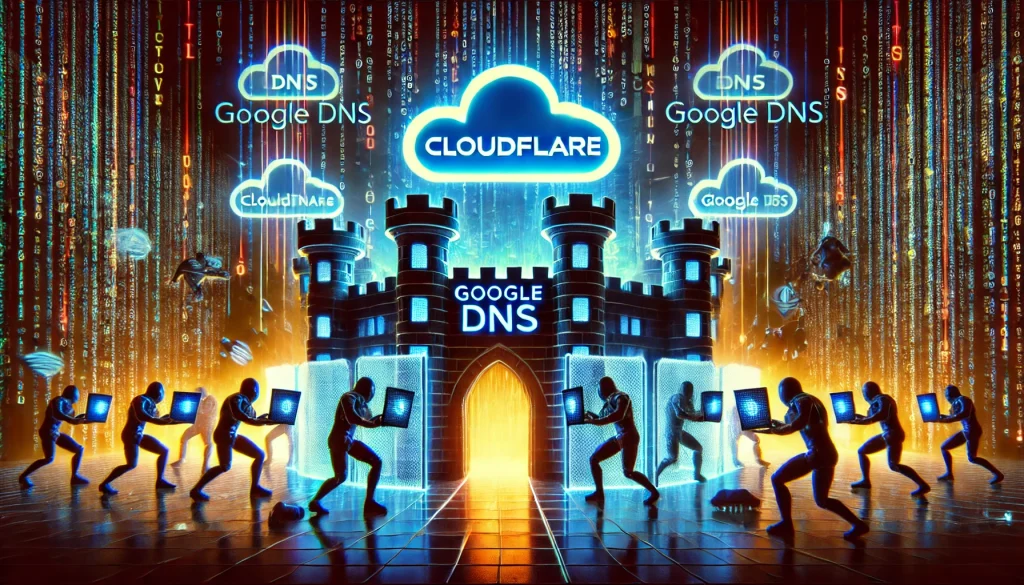Recent developments in the technology sector have sparked significant discussions among internet users and cybersecurity experts. Internet Service Providers (ISPs) have reportedly hijacked DNS requests to Cloudflare and Google, leading to widespread concerns about internet freedom and user privacy. This unprecedented move has drawn attention from industry professionals and has potential implications for the broader landscape of cyberspace, including emerging technologies like the metaverse.
Cloudflare DNS Hijacked by ISPs
In a surprising turn of events, multiple Internet Service Providers (ISPs) have hijacked DNS requests made to Cloudflare and Google. This tactic, which involves intercepting user requests to these popular DNS providers, has effectively disrupted access to various websites and services, raising alarm among internet users and cybersecurity experts alike. The hijacked DNS requests have resulted in the redirection of users to ISP-controlled servers, bypassing the intended security features of Cloudflare and Google’s DNS. This incident has sparked widespread outrage as it directly challenges the principles of an open and secure internet, a cornerstone of the digital age and the evolving metaverse.
Cloudflare DNS Hijacking Hits Malaysia

The hijacking of DNS requests was first reported in early August 2024, primarily in Malaysia and other regions. These incidents significantly disrupted internet service, sparking backlash from users relying on Cloudflare and Google DNS for security.
Cloudflare: User Trust Breached

Cloudflare
It is a leading internet security company that provides content delivery network (CDN) services and DNS management. Widely recognized for its efforts to improve internet security and performance, this hijacking incident raises significant concerns for its user base.
Google, one of the world’s largest tech giants, operates a public DNS service renowned for its speed and security. The company’s involvement in this situation underscores the widespread impact of the ISP actions, as Google DNS is a critical service for millions of users globally.
ISPs (Internet Service Providers)
The ISPs involved in this hijacking operation remain unnamed at this stage, but their actions have drawn criticism for violating user trust and potentially breaching legal and ethical standards. These providers allegedly redirect DNS requests to their own servers, bypassing the security protocols of Cloudflare and Google DNS.
DNS Hijacking: Neutrality and Security

Impact on Net Neutrality and the Open Internet
This development is significant for several reasons. Firstly, it directly attacks net neutrality and open internet principles, as ISPs override user choices and redirect traffic. This could set a dangerous precedent, allowing ISPs greater control over user access in cyberspace, potentially influencing digital freedoms in the metaverse’s future.
Security and Privacy Concerns
Moreover, the hijacking of DNS requests compromises the security and privacy of users, as DNS requests often contain sensitive data. ISPs intercepting and redirecting requests raises concerns about potential data misuse and surveillance. This undermines internet infrastructure trust.
Tech CEOs Condemn DNS Hijacking Incident
Matthew Prince, CEO of Cloudflare
Matthew Prince, expressed his concerns over the incident, stating, “The hijacking of DNS requests by ISPs is a grave violation of internet security and user trust. It not only undermines the foundational principles of the internet but also poses a significant threat to the privacy and safety of users. We urge all stakeholders to take immediate action to prevent such occurrences in the future.”
Sundar Pichai, CEO of Google
Sundar Pichai, also addressed the situation, saying, “At Google, we remain committed to providing secure and reliable internet services. The recent actions by certain ISPs are alarming, as they compromise the integrity of DNS services that millions of users depend on daily. We are actively investigating this matter and will work with industry partners to ensure that such incidents do not repeat.”
Conclusion
The hijacking of DNS requests by ISPs marks a concerning development in the ongoing struggle for control over the internet. As cyberspace continues to evolve and the metaverse becomes a more prominent part of our digital lives, safeguarding the principles of an open and secure internet is more critical than ever. The actions of these ISPs highlight vulnerabilities that must be addressed to protect user privacy and maintain trust in internet infrastructure. As the situation unfolds, industry experts and users alike will be closely watching for any further developments.
FAQ
What is DNS hijacking, and how does it impact internet users?
DNS hijacking is a malicious activity where attackers redirect DNS requests to unauthorized servers, compromising user privacy and access to websites. This can disrupt internet services, leading to potential data breaches and unauthorized surveillance.
How does this incident affect the future of the metaverse?
The incident raises concerns about the security of cyberspace, a critical aspect of the metaverse. If ISPs can hijack DNS requests, it could lead to increased control over user access to digital spaces, affecting the freedom and openness of the metaverse.
What can users do to protect themselves from DNS hijacking?
Users can protect themselves by using encrypted DNS services, such as DNS over HTTPS (DoH) or DNS over TLS (DoT). Additionally, being aware of the ISPs they choose and advocating for stronger net neutrality laws can help mitigate the risks of DNS hijacking.
Resources
- TorrentFreak. ISPs hijack Cloudflare and Google DNS requests, ending site-blocking workarounds.
- YCombinator. ISPs hijacking Cloudflare and Google DNS requests.
- Lemmy. ISPs hijacking connections to Google and Cloudflare DNS.
- Yahoo News. Malaysian telcos hijacking connections to Google and Cloudflare DNS, blocking site workarounds.

